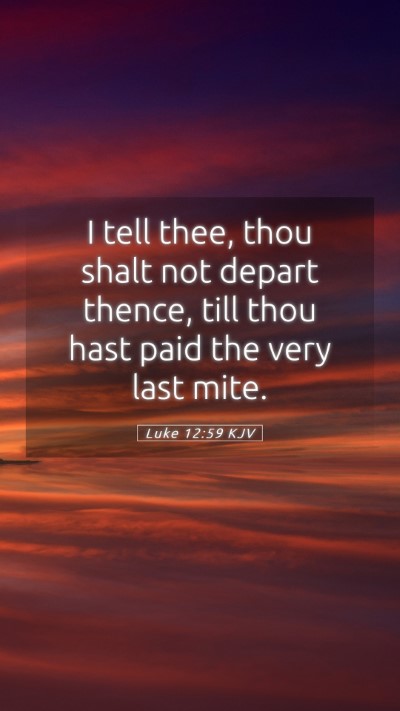Bible Verse Commentary: Luke 12:59
Verse: "But I say unto thee, thou shalt not depart thence, till thou hast paid the very last mite."
Meaning of Luke 12:59
This verse from the Gospel of Luke carries significant weight in understanding accountability and judgment. In the context, Jesus emphasizes the importance of settling one's account before God, reflecting not just on monetary debts but also on spiritual obligations and moral responsibilities.
Insights from Public Domain Commentaries
-
Matthew Henry's Commentary:
Henry interprets this phrase as a stern warning about the consequences of our actions. He suggests that the "very last mite" signifies the extreme exactness with which God's justice operates. Every small detail matters, and though one might overlook minor offenses, in God’s eyes, they are all of equal significant value.
-
Albert Barnes' Notes:
Barnes discusses the notion of eternal debts that cannot be ignored or escaped. He posits that the context of the passage relates to the spiritual debt we owe due to sin and the need for repentance. The "last mite" embodies the idea that all debts, regardless of size, need to be reconciled before we can attain peace with God.
-
Adam Clarke's Commentary:
Clarke emphasizes the urgency of repentance, indicating that the reference to a "mite" (a small coin) is illustrative of God's meticulous nature towards sin. He posits that the matter of judgment underscores that there are no shortcuts in resolving our spiritual debts. Thus, the notion of being held accountable is paramount in understanding our relationship with God.
Key Themes in Luke 12:59
- Accountability: One must acknowledge and address their spiritual and moral debts.
- Justice of God: God’s judgment considers all actions, however minor they may seem.
- Urgency of Repentance: There is a pressing need for individuals to resolve their debts before God.
Application of Luke 12:59
The verse serves as a reminder for believers about the necessity of repentance and living a life that is conscious of God’s expectations. Engaging in Bible study groups and utilizing Bible study tools can enhance understanding in applying these insights to daily life.
Cross References
- Matthew 5:25-26 – A parallel teaching on settling debts.
- Romans 14:12 – Each person will give an account of themselves to God.
- Luke 16:2 – Being faithful in small matters is important as it reflects our integrity.
Broader Context of Jesus' Teaching
In the broader narrative, Jesus is addressing the consequences of our actions and the importance of being prepared. As believers, understanding Scripture not only unlocks the "meaning of Bible verses" but also facilitates a thoughtful examination of our lives in light of the Word.
Conclusion
Luke 12:59 serves as a profound teaching on the concepts of accountability and divine justice. By engaging in thoughtful Bible verse interpretations and reflections, believers can uncover rich insights that apply both in spiritual and practical dimensions of daily living. This understanding encourages us to be diligent in cultivating our relationship with God and addressing any spiritual debts we may carry.


